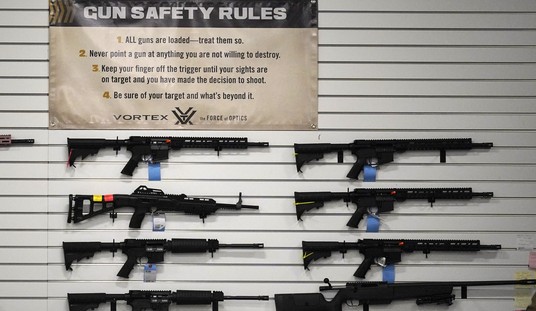Not just any politician either. Nikki Fried is the Florida Agriculture Commissioner, which means she’s actually in charge of the state’s concealed carry program. She’s also a holder of a medical marijuana card from the state of Florida, which may mean she’s violating federal law.
Fried, the only Democrat in the Florida Cabinet, devoted much of her 2018 campaign to advocating for greater access to medical marijuana in Florida. Problem: She has also made no secret of her licenses to buy medical marijuana and to carry a concealed weapon.
“I have both,” Fried said on a Trulieve-sponsored Marijuana Solution podcast shortly before taking office in January. “So I want to make that very clear, that I will not be taking anybody’s concealed weapons permit … or not renewing them. I see no conflict between the two.”
But the federal government does. Classified by the Controlled Substances Act of 1970 as a Schedule 1 drug, marijuana by definition has “no currently accepted medical use and a high potential for abuse.”
Federal law would seem to trump state concealed-carry laws, meaning, in some experts’ opinions, Fried cannot legally have both her cards.
Billy Cox of the Herald-Tribune in Sarasota, Florida’s penned an interesting story, and the entire thing is worth a read. This isn’t the first time we’ve seen issues related to gun ownership (or gun purchases) and medical marijuana. Back in March, Reason‘s Spence Purnell covered how the conflict is playing out in Pennsylvania.
The Pennsylvania state police website maintains that it is illegal for citizens to possess both a medical marijuana card and a firearm, meaning that the underlying legal structure has not changed. Pennsylvania’s health agency has simply ceased reporting the marijuana registry to the JNET database, making enforcement of the law much more difficult. Medical patients are still required to have a physical card that law enforcement and firearms dealers could ask for that would invalidate the purchase or possession of a firearm, but no law requires that the card be carried at all times nor that firearms dealers ask for that card at the time of purchase. Pennsylvania is the first state to take this step and could represent a model for other states to follow since there is no explicit legal mandate from the federal government forcing states to share data between agencies.
Purnell notes that the issue here really is the conflict between federal gun laws enforced by the ATF and the state cannabis laws passed by a growing number of states.
While the federal government has been generally tolerant of state experimentation with cannabis legalization, the Bureau of Alcohol, Tobacco, Firearms and Explosives (ATF) has made it clear it will not tolerate mixing cannabis and guns. Thus, firearms dealers will have to abide by the ATF’s rules by denying medical cannabis card holders and anyone convicted of illegal cannabis possession the right to purchase guns. This raised the question: How can firearms dealers obtain medical cannabis information?
The enforcement of this law creates an absurd policy issue as states must register medical cannabis patient data but not recreational marijuana consumer data. As a result, medical cannabis patients are denied gun rights because the state keeps a registry that shows up when firearm background checks are conducted. Recreational users, however, are not required to register to purchase retail cannabis and are therefore untracked. The contradiction is blatant and damaging to medical patients, especially for those using the non-psychoactive CBD compound found in cannabis products that are commonly used to mitigate epileptic seizures.
My wife was diagnosed with non-small cell lung cancer three years ago. I can’t tell you how many well-meaning people have emailed me or reached out on social media to encourage her to try various cannabis products, either to treat the cancer itself or to help her deal with the side effects of her chemotherapy drugs like nausea and loss of appetite. I live in Virginia, which until very recently had no medical marijuana laws in place, so it’s been a moot point, but it has made me think quite a bit about the issue over the past few years, and I’ve come to the conclusion that Congress needs to step in and fix this issue.
I believe it is unconscionable to tell a cancer patient that they must choose between their right of self-defense and their ability to go through the day without vomiting every time they try to eat some solid food. I believe it is unjust to tell a veteran diagnosed with PTSD that they must give up their 2nd Amendment rights if they get a medical marijuana card. I believe it is inhumane to tell dozens of medical marijuana patients to turn in their guns or risk arrest and prosecution.
Heck, the American Legion (not really an organization of drug-addled hippies) has come out in favor of the federal government removing cannabis from the FDA’s “Schedule 1” designation of having “no medical benefit”, in large part because of the growing number of veterans who risk breaking federal law by owning guns and trying to take care of themselves. The current law actually incentivizes people to buy cannabis on the black market rather than through the regulatory systems set up by states, because they’re much less likely to be found out and face legal repercussions.
With many Republicans against legalization or decriminalization of cannabis and many Democrats against legal gun ownership, it’s likely that any attempt to reform the Gun Control Act of 1968 to change the language and allow for medical marijuana patients to legally purchase (and even own) firearms is going to face an uphill battle. Public officials like Nikki Fried highlighting the issue may sway a few hearts and minds on Capitol Hill, but if veterans and cancer patients can’t move enough members of Congress to get something done, I’m pretty sure Florida’s Agriculture Commissioner isn’t going to be the difference-maker.









Join the conversation as a VIP Member